Filter by
749 results found
-

Unpacking the politics of Nature-based Solutions governance: Making space for transformative change
Participatory governance is touted as a driver of transformative change, but often falls short of its promises. Dominant framings can reinforce vested interests and marginalise alternative perspectives. Technoscientific and market-oriented approaches, risk and uncertainty, and “democracy washing” shape transformative NbS. -

Nature-Based Solutions Initiative at the British Ecological Society Annual Meeting 2024
At the British Ecological Society’s Annual Meeting, the Nature-Based Solutions Initiative (NbSI) took centre stage. Professor Nathalie Seddon, Director of NbSI, delivered the prestigious Georgina Mace Lecture, highlighting the need for an eco-centric approach that integrates ecological science with Indigenous and Local Knowledge (ILK) -

Humanity at a crossroads: can stories inspire where data has not?
Humanity is on a perilous path, driving the biosphere—and our shared future—toward collapse. Can stories inspire transformative change where data alone has failed? This pressing question was explored at the latest Oxford Ministry for the Future event, where NbSI’s director Prof Nathalie Seddon joined award-winning author Richard Powers and fellow academics to discuss how storytelling can catalyse meaningful action for a sustainable future. -

The Academia and Research Organisations group: engagement at CBD COP16
The Academia and Research Organisations group (A&R group) provides a collective platform to support meaningful participation and engagement of academics and researchers in CBD processes. -

Fragmented Governance Endangers Biodiversity, Climate, and Human Systems, Warns IPBES Report
A new report from the Intergovernmental Science-Policy Platform on Biodiversity and Ecosystem Services (IPBES) highlights the dangers of fragmented governance across biodiversity, climate change, food, water, and health systems. The "Nexus Assessment" emphasizes the interconnectedness of these crises and warns that addressing one issue in isolation risks compounding others. -

How can we monitor soil health for NbS?
New research by NbSI and the University of Aberdeen proposes an integrated approach for monitoring soil heath in NbS, introducing a tool for selecting suitable biodiversity and soil metrics based on context and scale. -

The promise and the challenges of Brazil’s new NDC
At COP29, Brazil was one of the first countries to submit its updated Nationally Determined Contribution (NDC), pledging to reduce greenhouse gas (GHG) emissions by up to two-thirds by 2035, compared to 2005 levels. -

Advancing nature-based solutions through enhanced soil health monitoring in the United Kingdom
This paper examines challenges and opportunities in selecting suitable soil health metrics. We find that standardization can facilitate widespread monitoring of soil health with benefits for stakeholders and user groups -

Balancing land use for biodiversity and climate
Interdisciplinary researchers and practitioners from across the globe recently convened in Oaxaca, Mexico, to explore pathways to sustainable and just land systems at the 2024 Global Land Programme Open Science Meeting. NbSI researchers Aline Soterroni and John Lynch presented new research offering solutions for uniting biodiversity and climate objectives, from broadening the definition of 'forest' in the new European Union Deforestation Regulation (EUDR), to recognising the value of peatland restoration for climate change mitigation. -

Harnessing Nature-based Solutions For Economic Recovery
This policy briefing outlines the key role of nature-based solutions (NbS) in supporting sustainable economic recovery and societal resilience. -

A Review of Life Cycle Assessment Methods to Inform the Scale-Up of Carbon Dioxide Removal Interventions
A new paper, led by Dr Isabela Butnar of UCL and NbSI’s Dr John Lynch, argues that we currently have only limited evidence to address these important questions. -

The imperative of aligning policy on climate and biodiversity
In a new article published yesterday in The Conversation, NbSI's Nathalie Seddon and Audrey Wagner explain why aligning climate and biodiversity policy is essential. The message is clear: healthy ecosystems are crucial for climate resilience and a stable climate is essential to protecting biodiversity. Climate action must not come at the expense of biodiversity or human rights. -

Do we have enough information to scale up carbon removals sustainably?
As COP29 of the UNFCCC commences in Azerbaijan, the need for effective and sustainable strategies to reduce greenhouse gas emissions is more critical than ever. However, most global scenarios also rely heavily on carbon dioxide removals (CDRs) to keep within the Paris Agreement temperature targets, and many ‘net-zero’ pathways indicated by governments contain a significant amount of CDR. But do we know what the wider effects of these CDR practices will be, or which approaches might be more or less sustainable? A new study assesses the current state of the evidence by reviewing the Life Cycle Assessment (LCA) literature on CDR. -

What just happened at COP16? NbSI reports from Colombia
What just happened in Cali? Quite a lot. The COP16 agenda was enormous—restoring the health of the biosphere in the face of an economy hell bent on destroying it is a deeply complex challenge. It was a monumental task for a small team to cover it all! Here, we reflect on some of the key takeaways on the big ticket agenda items as well as on the key the issues we tracked over the past two weeks. -

Nature-based solutions for transformative change at COP16
At the halfway point of COP16 in Cali, our Director, Nathalie Seddon, joined fellow academics and researchers to discuss how nature-based solutions (NbS) can drive the transformative change urgently needed to restore balance between people, nature and climate. -
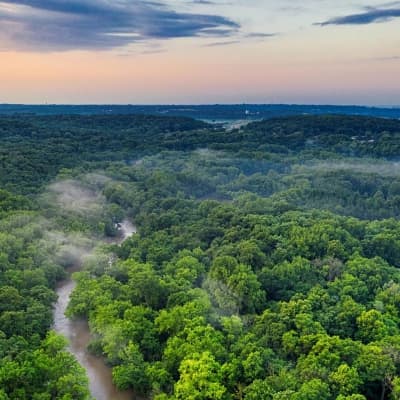
Update from COP16: Signs that Latin America is stepping up on climate and nature leadership
As hosts of the COP16 Biodiversity summit and the upcoming COP30 Climate, Colombia and Brazil are showing signs of leadership on how the crises of biodiversity loss and climate change are closely linked and must be tackled together. An open letter from over 70 global leaders – representing business, finance, civil society, Indigenous Peoples and youth – calls on President Petro of Colombia and President Lula of Brazil, to drive ‘one year of united action on climate, nature and food.’ -

Supporting the economy with nature-based solutions
Our new research just out in PLOS Climate shows how NbS have the potential to drive job creation, boost income, whilst also supporting climate and sustainable development goals. -
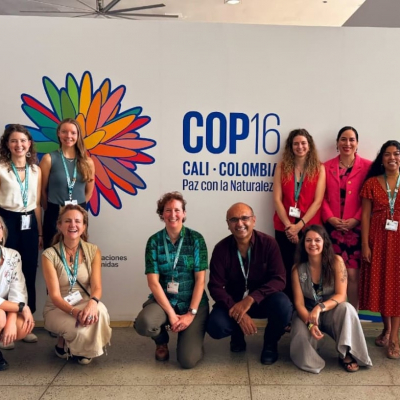
NbSI at COP16: What we’re doing, what’s happening, and what outcomes we’re hoping for
As global leaders gather for COP16, it is time to turn commitments into action for nature, climate, and equity. From the ground in Cali, the NbSI team brings insights and updates as we lead Oxford's delegation, co-coordinate the Academic & Research caucus, contribute to side events, and advocate for high-integrity nature-based solutions, rights-based approaches and biodiversity-climate synergies. -

Growing positive change – NbS Conference 2024 insights, report and recordings
As COP16 commences in Cali, we are delighted to announce the release of our NbS Conference 2024 Report and Recordings, highlighting critical actions for aligning climate and biodiversity agendas to support social-ecological flourishing. -
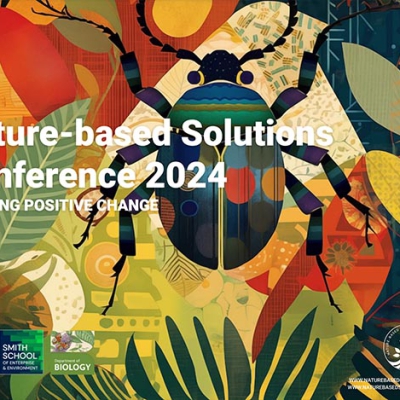
Growing Positive Change – NbS Conference Report
We are delighted to announce the release of our NbS Conference 2024 Report and Recordings, highlighting critical actions for aligning climate and biodiversity agendas to support social-ecological flourishing. -
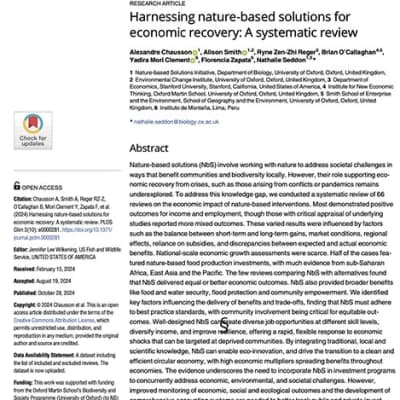
Harnessing nature-based solutions for economic recovery: A systematic review
A systematic review of 66 reviews on the economic impact of nature-based interventions. Nature-based solutions (NbS) involve working with nature to address societal challenges in ways that benefit communities and biodiversity locally. However, their role supporting economic recovery from crises, such as those arising from conflicts or pandemics remains underexplored. -
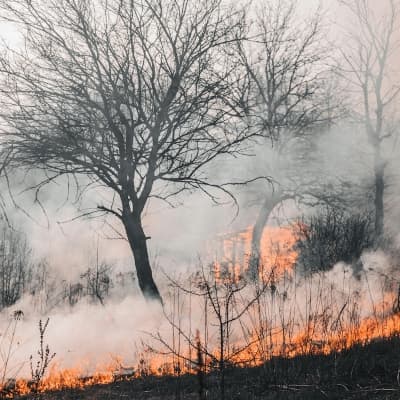
The cost-effectiveness of nature-based solutions for reducing disaster risk
New study finds nature-based solutions to be more cost-effective than conventional engineering solutions for disaster risk reduction -
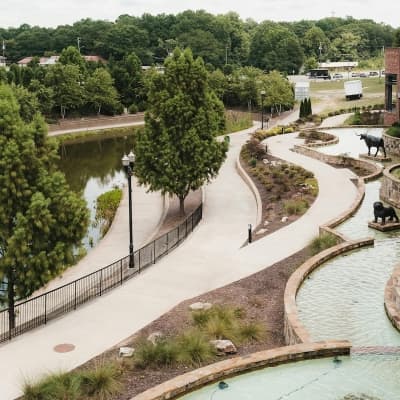
Survey: how can we design better green infrastructure in line with NbS principles?
If you work with either NbS or green infrastructure, please visit our short survey to tell us whether you think these principles are useful and feasible to implement in practice. -
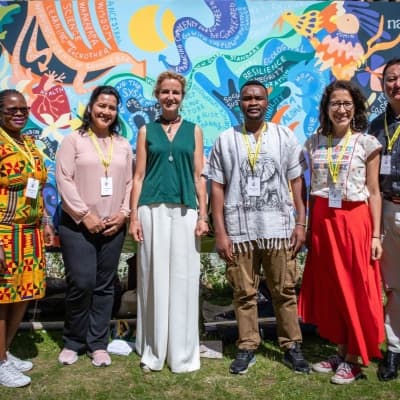
Rising NbS leaders and bursary winners reflect on the NbS Conference 2024
Rising leaders in the field of nature-based solutions reflect on their experience attending the NbS Conference in the summer. -

Insights from Paris Amazon Week
NbSI Research Fellow Aline Soterroni spoke at Amazon Week in Paris, addressing the pathways and challenges towards achieving zero deforestation in the Amazon.
